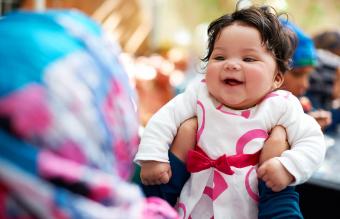
Learn about Egyptian family values including the role of men, women, and children within the family unit. Dive into how Egyptian babies are celebrated along with marriage and divorce.
Modern Egyptian Family Values
In Egypt, the family is important. And not just your immediate family, but your extended family as well. Many generations of Egyptians live together in one family unit. They also live close to their extended family. The children, typically boys, of the family live with parents at least until they marry and possibly beyond to take care of their aging parents. The daughter-in-law typically moves in with her in-laws. Frequent gatherings ensure that even extended family stays close.
Collectivist Society
Due to their strong family ties, Egypt is seen as a collectivist society. Individuals in a family unit or even a community work together to raise children. They build loyalties with one another, and their loyalty to family can trump any other regulations or rules. However, this also means that if one person in the family loses face, then they all lose face.
Egyptian Household Structure
Age comes with authority in Egyptian families. Therefore, the authority comes from the oldest member in the house. This is typically the oldest male, but it can be the oldest female member as well. However, since 90% of Egyptians are Muslim (predominantly Sunni), the household structure is generally patriarchal, with men and women having different roles.
Role of Men
Within the family structure, Egyptian men are typically the providers of the family. They can also have more influence on the decision making of the family. For example, a clerk may approach the man of the family before approaching the female of the family.

Role of Women
Historically, women have been seen in traditional roles in Egypt. Therefore, they were housewives; however, women's roles are changing within Egypt. While women still show modesty, they do wear Westernized clothing and a more liberal lifestyle. However, this depends on the area in which you live. Liberal Egyptian women are seen more in urban areas. Many women also currently work, depending on the needs of their families.
Egyptian Children
Children are a pivotal part of the family unit in Egypt. Egyptian children typically live with their parents until marriage and possibly beyond. When children do leave their families after marriage, they do not typically go too far away, and they visit often. Formal education is very important in urban areas of the country, and public schools are free to attend. However, private schools are also available for children. Education and religious instruction also come from the family unit.
Egyptian Baby
The birth of a child, especially the first son, is seen as a time for celebration in an Egyptian family. There is typically a celebration a week after the birth of the child. This celebration is called the Sebou and includes several unique traditions.
Dating & Marriage
When it comes to dating and marriage of the children in a family, it's a bit different from Western cultures. Dating isn't as common in Egypt as it is in America. In fact, it's actually discouraged in Islam. Additionally, marriages are arranged by two-family units. The arrangements are done by the family heads or a matchmaker, but modern Egyptian children are getting more say in their life partner. Typically, the matches between families take several details into account when making matches such as social class, religion, education, and more.
Divorce in Egypt
Divorce rates in Egypt are relatively low, but it is on the rise. According to Egypt Today, in 2018, divorce rates have increased by 6.5% from 2016 to 2017. Both partners are able to dissolve the marriage, but men have more rights. However, Egypt is working on reforming women's rights during a divorce.
The Egyptian Family Unit
The modern Egyptian family is reforming compared to ancient Egyptian rules. However, the family is still very important to Egyptian culture, and babies are celebrated.







